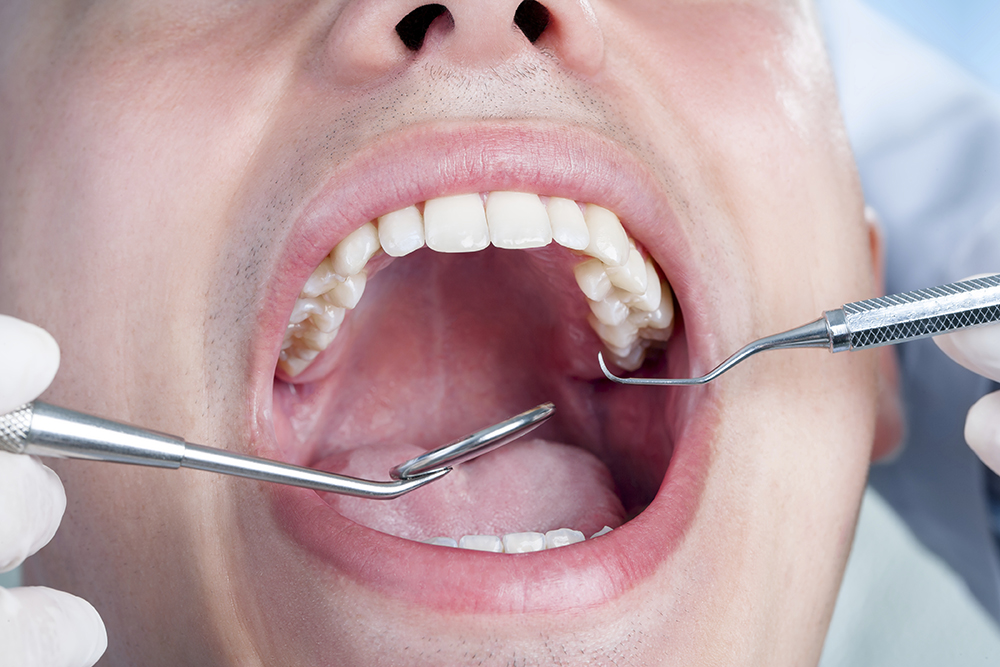Along with understanding the importance of daily teeth brushing, you will most likely also know that gum disease also plays a vital role in good oral hygiene. Gums and teeth are a partnership that together help to maintain a healthy mouth. But other than being aware of the telltale bleeding gums, just how much do you know about gum disease and how to spot, treat and prevent it? Read on for everything you need to know from the team at Cotteswold House Dental Care in Gloucester.
What is gum disease?
Gum disease is a common condition in adults that results in sore, swollen and infected gums. It is initially caused by the build-up of plaque, which is the sticky layer of bacteria and food that gets left behind without proper brushing. If left, this plaque hardens into tartar, which makes thorough teeth cleaning difficult. This in turn leads to the familiar bleeding gums during brushing, along with the associated bad breath or unpleasant taste in the mouth. This is the first stage of gum disease and is called gingivitis, which means inflammation of the gums.
Unfortunately, ginigivitis is easily, and often, ignored as the symptoms can be mild and are not usually painful. However, if not treated it will lead to the next, more serious, stage of gum disease known as periodontitis. This is where the gum and bone move from around the teeth, creating spaces that can collect food and bacteria. Infection occurs, resulting in damage to the jawbone and connective tissues. This is not reversible and is one of the most common reasons for tooth loss in adults.
What causes gum disease?
The main cause of gum disease is poor dental hygiene, which results in plaque accumulating on the teeth. Plaque contains bacteria and if it isn’t removed by brushing, your gums will become sore and inflamed. Other factors that can contribute to gum disease are illness, hormonal changes, medication, smoking and family history.
Signs and symptoms of gum disease
At first, gum disease (gingivitis) isn’t always noticeable or it may only affect some teeth. The main symptoms are gums that bleed easily when you brush your teeth, as well as the redness, soreness and swelling mentioned above.
As gingivitis develops into the more serious periodontitis and the ‘pockets’ between teeth and gums form, abscesses and receding gums can occur, and eventually teeth can loosen and fall out. Occurrences of periodontitis do increase with age and it is likely that most people will suffer to some extent, so it is vital to not slip into bad dental habits.
How to treat gum disease
The good news is that gingivitis can be prevented, treated and even reversed by cleaning your teeth twice and day, flossing and regular check up with your dentist in Gloucester and visits to the hygienist. Many patients schedule to see our hygienist in Gloucester for the same visit as their dental appointment, which makes finding the time a lot easier. We offer a comprehensive Healthy Mouth plan where, starting from just £16 a month, all your Cotteswold House dental check-ups and hygienist visits are covered, helping you keep on top of any issues that might arise.
If you are concerned that you have gingivitis, the first step is to visit your dentist. They will be able to examine your mouth and check the extent of the problem, and if necessary they will carry out an x-ray to check your teeth and jaw bone. This assessment is important to see how advanced your gum disease is so it can be treated accordingly. Following this, your dentist will perform a scale and polish to thoroughly clean your teeth and remove any plaque and tartar. If you have the more advanced periodontitis, root planing may be required; whilst using a local anaesthetic rub, your dentist with smooth the tooth roots so that the gums can reattach to the teeth.
How to prevent gum disease
Prevention is the same as treatment for the first stage of gum disease. If you stay on top of your oral hygiene at home and make sure you attend regular dental care and hygienist appointments, you will be able to catch any negative developments early on. Along with your twice daily brushing and flossing, using a mouthwash to help remove plaque and changing your toothbrush regularly is a good idea. We also advise that you stop smoking, if applicable.
Next steps
If you have any concerns or questions about the health of your gums, please contact our Cotteswold House Dental Care team to arrange an appointment.

